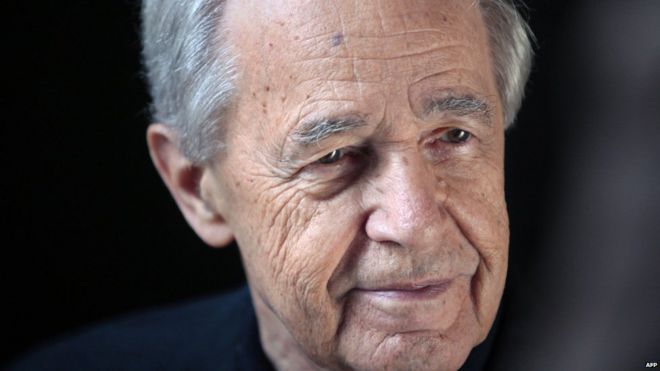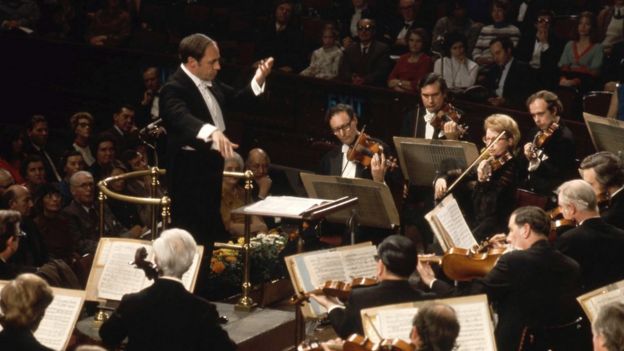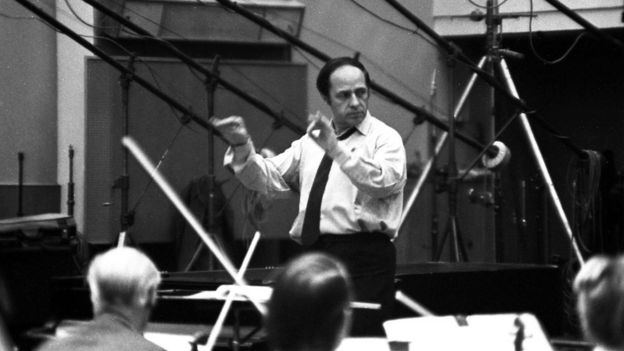Pierre Boulez, the French composer who compared composition to a labyrinth, turned 90 in June. What we said then
2016年1月5日 法國作曲家布列茲去世
凱因斯說過一句常被引述的名言:「長期來看,我們都死了。」不過以壽命幅度來說,有些人的長期比較長,有些則比較短。享年九十歲的布列茲(Pierre Boulez),無疑屬於長的。而在漫長的創作生涯中,布列茲是當代音樂許多重要事件的一部份。比方說──
1952年,約翰凱基在胡士托的一處穀倉開了一場音樂會,這場音樂會之所以聲名遠播或說惡名昭彰,是因為凱基發表了一首「新作」──《四分三十三秒》。這首作品大大愚弄了聽眾,引起的眾怒不斷延燒,至於那場音樂會還演了哪些曲目,反倒沒人注意了。
布列茲《第一號奏鳴曲》(Premiere Sonate),就在那場音樂會的曲目中。
更早幾年,凱基在1949年到過法國,就接觸到布列茲的音樂。布列茲在巴黎出版了《第二號奏鳴曲》(Second Sonata),凱基設法找到樂譜,回美國的時候,手上拿著這份樂譜,並設法在紐約找一位技巧夠好的鋼琴家來彈這首困難的作品。幾經尋覓之後,他把《第二號奏鳴曲》拿給費德曼(Morton Feldman)看。而費德曼認為,只有大衛.刁特(David Tudor)能彈,於是就介紹凱基跟大衛認識。大衛馬上開始練這首曲子,而且他不只是練音符而已,他還去學法文,為的是讀阿爾托(Antonin Artaud)、夏爾(Rene Char)和馬拉美(Mallarmé)的原作,讓自己盡可能地活在布列茲《第二號奏鳴曲》的氣氛中。
1952年首演凱基《四分三十三秒》的這場音樂會,鋼琴家正是大衛.刁特,曲目除了布列茲之外,還有莫頓.費德曼、布朗、柯維爾等人的作品。如此勾勒一番,似乎可以看到布列茲在這場音樂會所扮演的微妙角色。
https://www.youtube.com/watch?v=VlxpsYcFupY----
http://www.bbc.co.uk/programmes/p03dr09k
“Today, the music world has lost one of its most significant composers and conductors. Personally, I have a lost a great colleague, a deeply admired creative mind and a close friend. Pierre Boulez and I first met in Berlin in 1964 and there have been few fellow musicians with whom I have developed such a close and important relationship in the 52 years that followed – even though we always stuck to the formal “vous” when speaking to each other, a rarity in our rather informal world, but from my side, certainly, an expression of my deepest respect and admiration.
“Creation exists only in the unforeseen made necessary”, Pierre Boulez once wrote. With this belief as his paradigm, Pierre Boulez has radically changed music itself as well as its reception in society. He always knew exactly when he had to be radical because it was a necessary requirement for music and society to develop. He was never dogmatic, however, but always retained his ability to develop himself further. His development was based on a deep knowledge of and respect for the past. A true man of the future must know the past, and for me, Pierre Boulez will always remain an exemplary man of the future.
Pierre Boulez has achieved an ideal paradox: he felt with his head and thought with his heart. We are privileged to experience this through his music. For this, and so much more, I will always be grateful.”
Daniel Barenboim, 6 January 2016
BBC
Composer Pierre Boulez dies at 90
- 1 hour ago
- Entertainment & Arts
 AFP
AFP
French composer and conductor Pierre Boulez has died at the age of 90.
His family said the world-renowned musician died on Tuesday at his home in Baden-Baden, Germany.
"For all those who met him and were able to appreciate his creative energy, his artistic vigour... will remain alive and strong," they said.
As well as being a world-famous composer and conductor he was a prolific writer and pianist and head of the music venue The Paris Philharmonic.
Boulez was also the founder and former director of the Paris based Institut de Recherche et Coordination Acoustique/Musique and was famed for his work alongside leading experimental composers such as Karlheinz Stockhausen and Olivier Messiaen.
French Prime Minister Manuel Valls paid tribute to Boulez on Twitter: "Courage, innovation, creativity, this is what Pierre Boulez meant to the world of French music, of which he made a beacon of light throughout the world."
French President Francois Hollande said in a statement: "Pierre Boulez made French music shine throughout the world. As a composer and conductor, he always wanted to reflect on the ages."

Boulez had been considered one of the most influential voices in the contemporary music since the 1950s and, as a conductor, he was in demand on both sides of the Atlantic.
One of his particular trademarks as a conductor was that he shunned the baton, always choosing to conduct with his hands.
As a composer, Boulez's work was noted for its difficulty, with one of his most celebrated works, Le Marteau Sans Maitre, being inspired by the complexity and lack of formal artistic structure of surrealist poetry.
Born in the Loire region of France in 1925, Boulez began his musical career at the Conservatoire in Paris, one of the world's most celebrated music schools.
He graduated in 1945 and, still only 21, became musical director of the theatre company of Jean-Louis Barrault and Madeleine Renaud.
During this period he composed violent early pieces such as his first two piano sonatas and Livre Pour Quatuor for the string quartet.

Analysis by arts editor Will Gompertz
Pierre Boulez was a truly great artist who ranks - in my book - alongside the likes of Marcel Duchamp, Jean Prouve and Albert Camus as an epoch-defining 20th Century French intellectual. He was not easy. He could be enormously charming and utterly horrible - sometimes to the same person in the same conversation.
Music was his art form, agitation his style. He had no time for the status quo, and even less for the days of yore. He was a modernist - a man who sought to make some sense of the absurdities of the world in which he lived through the medium of music. It was a new age with new problems that he believed demanded a new sound.
The flowery, romantic classical cannon didn't resonate in his mechanised Parisian infrastructure full of hard edges and cold steel. Something sharper, less melodic and altogether more complex was required.
He championed the original modernist avant-garde of Stravinsky, Bartok, Berg and Messiaen (his tutor), while also supporting pioneering peers such as Ligeti, Birtwistle and Stockhausen.
His own compositions, which were relatively few in number, have come to be highly regarded. If I were to choose one work it would be Notations, his 12 pieces for piano. It is spiky, difficult, unpredictable, poetic, and unsurpassable. Just like the man himself.

Great demand
Boulez's career as a conductor took off in the 1950s, during which time he performed with the Sudwestfunk (South-West German Radio).
He also began acting as guest conductor for some of Europe's leading orchestras and festivals.
Boulez's talent led him to be more and more in demand and he was appearing widely as a conductor by the 1960s.
He led the BBC Symphony Orchestra from 1971-75 and from 1971-77 was also music director of the New York Philharmonic, where he championed contemporary works - a contrast from his acclaimed predecessor Leonard Bernstein.
Increasingly, Boulez became exasperated with what he considered to be the suffocating conservatism of the French musical world, prompting him to make his home in Baden-Baden.
Multiple honours
His rebellious nature also led him once being briefly detained by Swiss police on suspicion of being linked to terrorist activities in the period of heightened security soon after the 11 September US terror attacks.
Swiss authorities confiscated his passport in the town of Basle, where he had been conducting at a music festival, after discovering he had said in the 1960s opera houses should be blown up and therefore considered him a potential security threat.
Alongside his conducting, Boulez's creative output flourished as the director of the experimental music studio, the Institut de Recherche et Coordination Acoustique/Musique (IRCAM), where he had access to the latest computer technology.
But he stepped down from this position in 1991 to devote more time to conducting.
In 2009, he joined with fellow conductor Daniel Barenboim to conduct the complete symphonies of Gustav Mahler at Carnegie Hall, New York.
Overall Boulez won 26 Grammys and multiple other honours, including Sweden's Polar Music Prize, Japan's Praemium Imperiale and France's Ordre des Arts et des Lettres.
He was also conducted into the Gramophone Hall of Fame in 2012.
BBC Radio 3 Music Matters and Proms presenter Tom Service said Boulez leaves "one of the most resonant legacies of any composer of the post-war period".
"The scale of Boulez's achievements across the whole of musical culture means that he will never truly disappear into the past tense. As listeners, performers, and composers, we will all be living out his legacy for generations to come."

沒有留言:
張貼留言